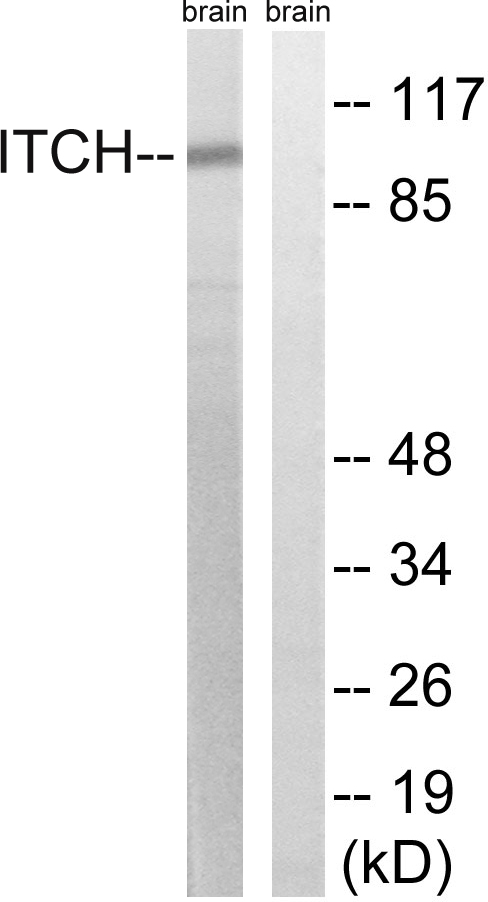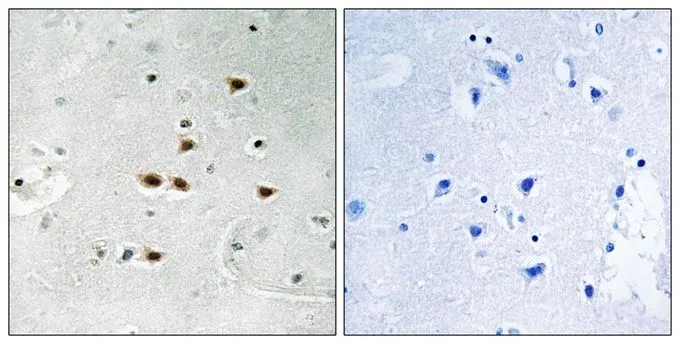![Whole cell extract (30 μg) was separated by 7.5% SDS-PAGE, and the membrane was blotted with ITCH antibody [GT1248] (GTX02845) diluted at 1:1000. The HRP-conjugated anti-rabbit IgG antibody (GTX213110-01) was used to detect the primary antibody. Whole cell extract (30 μg) was separated by 7.5% SDS-PAGE, and the membrane was blotted with ITCH antibody [GT1248] (GTX02845) diluted at 1:1000. The HRP-conjugated anti-rabbit IgG antibody (GTX213110-01) was used to detect the primary antibody.](https://www.genetex.com/upload/website/prouct_img/normal/GTX02845/GTX02845_4000001759_20210122_WB_2_w_23053123_848.webp)
Whole cell extract (30 μg) was separated by 7.5% SDS-PAGE, and the membrane was blotted with ITCH antibody [GT1248] (GTX02845) diluted at 1:1000. The HRP-conjugated anti-rabbit IgG antibody (GTX213110-01) was used to detect the primary antibody.
ITCH antibody [GT1248]
GTX02845
ApplicationsWestern Blot
Product group Antibodies
ReactivityHuman, Mouse, Rat
TargetITCH
Overview
- SupplierGeneTex
- Product NameITCH antibody [GT1248]
- Delivery Days Customer9
- Application Supplier NoteWB: 1:500 - 1:2000. *Optimal dilutions/concentrations should be determined by the researcher.Not tested in other applications.
- ApplicationsWestern Blot
- CertificationResearch Use Only
- ClonalityMonoclonal
- Clone IDGT1248
- Concentration1.6 mg/ml
- ConjugateUnconjugated
- Gene ID83737
- Target nameITCH
- Target descriptionitchy E3 ubiquitin protein ligase
- Target synonymsADMFD, AIF4, AIP4, NAPP1, E3 ubiquitin-protein ligase Itchy homolog, HECT-type E3 ubiquitin transferase Itchy homolog, NFE2-associated polypeptide 1, atrophin-1 interacting protein 4, itchy E3 ubiquitin protein ligase homolog
- HostRabbit
- IsotypeIgG
- Protein IDQ96J02
- Protein NameE3 ubiquitin-protein ligase Itchy homolog
- Scientific DescriptionThis gene encodes a member of the Nedd4 family of HECT domain E3 ubiquitin ligases. HECT domain E3 ubiquitin ligases transfer ubiquitin from E2 ubiquitin-conjugating enzymes to protein substrates, thus targeting specific proteins for lysosomal degradation. The encoded protein plays a role in multiple cellular processes including erythroid and lymphoid cell differentiation and the regulation of immune responses. Mutations in this gene are a cause of syndromic multisystem autoimmune disease. Alternatively spliced transcript variants encoding multiple isoforms have been observed for this gene. [provided by RefSeq, Mar 2012]
- ReactivityHuman, Mouse, Rat
- Storage Instruction-20°C,2°C to 8°C
- UNSPSC41116161
References
- DUSP3 regulates phosphorylation-mediated degradation of occludin and is required for maintaining epithelial tight junction. Chou HC et al., 2022 Jun 15, J Biomed SciRead this paper

![WB analysis of various samples using GTX02845 ITCH antibody [GT1248]. Dilution : 1:1000 Loading : 25μg WB analysis of various samples using GTX02845 ITCH antibody [GT1248]. Dilution : 1:1000 Loading : 25μg](https://www.genetex.com/upload/website/prouct_img/normal/GTX02845/CutImage_A8624_WB_01_(1073814)_w_23053123_544.webp)
![Various whole cell extracts (30 μg) were separated by 7.5% SDS-PAGE, and the membrane was blotted with ITCH antibody [GT1248] (GTX02845) diluted at 1:1000. The HRP-conjugated anti-rabbit IgG antibody (GTX213110-01) was used to detect the primary antibody. Various whole cell extracts (30 μg) were separated by 7.5% SDS-PAGE, and the membrane was blotted with ITCH antibody [GT1248] (GTX02845) diluted at 1:1000. The HRP-conjugated anti-rabbit IgG antibody (GTX213110-01) was used to detect the primary antibody.](https://www.genetex.com/upload/website/prouct_img/normal/GTX02845/GTX02845_4000001759_20210122_WB_w_23053123_959.webp)
![WB analysis of various samples using GTX02845 ITCH antibody [GT1248]. Dilution : 1:1000 Loading : 25μg WB analysis of various samples using GTX02845 ITCH antibody [GT1248]. Dilution : 1:1000 Loading : 25μg](https://www.genetex.com/upload/website/prouct_img/normal/GTX02845/CutImage_A8624_WB_02_(1073815)_w_23053123_502.webp)
![WB analysis of wide type (WT) and ITCH knockout (KO) 293T cells using GTX02845 ITCH antibody [GT1248]. Dilution : 1:1000 Loading : 25μg WB analysis of wide type (WT) and ITCH knockout (KO) 293T cells using GTX02845 ITCH antibody [GT1248]. Dilution : 1:1000 Loading : 25μg](https://www.genetex.com/upload/website/prouct_img/normal/GTX02845/CutImage_A8624_KO-WB_01_(1080317)_w_23053123_756.webp)




